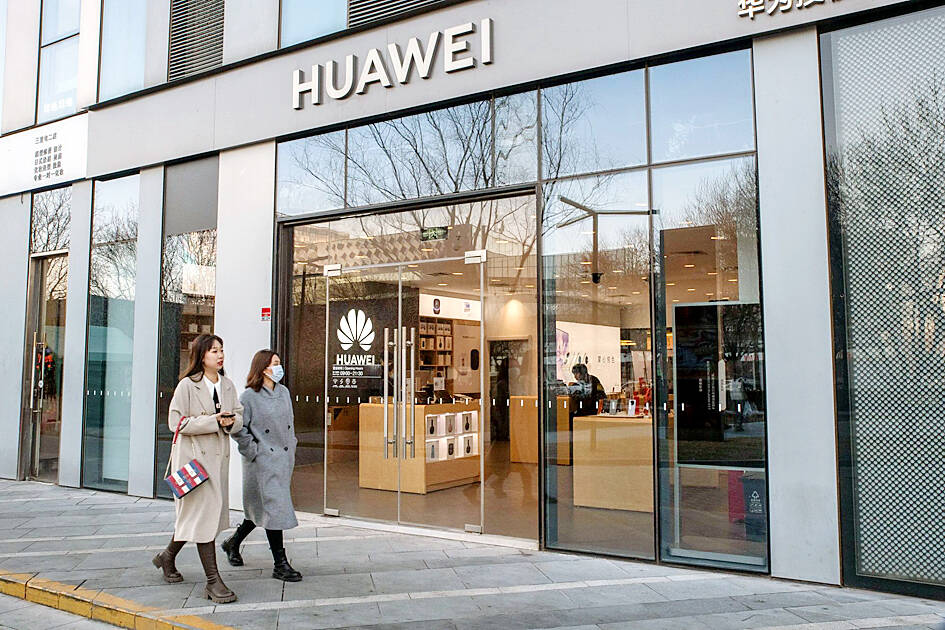US President Joe Biden’s administration is considering cutting off Huawei Technologies Co (華為) from all of its US suppliers, including Intel Corp and Qualcomm Inc, as Washington intensifies a crackdown on the Chinese technology sector.
Sales from US firms to Huawei have been limited for four years since former US president Donald Trump added the Shenzhen, China-based company to the US “entity list” out of national security concerns. US suppliers have since required government approval to sell to the telecom equipment giant.
Now, some officials in the Biden administration are advocating a ban on all sales to Huawei — which has long been suspected of having ties to the Beijing government and Chinese military — as Washington debates whether and how to adjust its licensing policy, people familiar with the matter said.

Photo: Bloomberg
The people asked not to be identified because a decision has not been made public.
Tensions with China have been rising throughout Biden’s presidency, and he is under pressure from Republicans controlling the US House of Representatives to continue squeezing Beijing, particularly to limit the country’s technological advances.
Huawei was once one of the world’s largest buyers of electronic components and a hugely important part of the supply chain because of its position in the handset and networking equipment industries.
Trump’s ban on certain sales crippled the Chinese company, while wiping out huge amounts of revenue for US suppliers such as Broadcom Inc, but the US Department of Commerce continued to allow some other products to be supplied to Huawei.
The company remains a US$100 billion behemoth that is spearheading the expansion of the world’s largest 5G network at home, while aiding the construction of critical broadband from Africa to the Middle East.
In December last year, the firm said that it was “business as usual” after successfully weathering US tech sanctions.
Under the new policy some officials advocate, all license requests to supply the company would be denied.
Meanwhile, most current applications for new licenses are languishing in a stalled approval process, the people said, creating a de facto halt.
The longer-term effect on Huawei from that action is uncertain. It still derives enormous revenue from local wireless carriers, such as China Mobile Ltd (中國移動), and state enterprises that rely on Huawei to build local-level and corporate networks.
China operates more than 2 million 5G base stations, or more than 60 percent of the world’s total, industry officials say.
Huawei has also been stockpiling foreign components such as chips and sourcing or researching alternatives to US circuitry.
Representatives for the company did not immediately respond to requests for comment.
Intel and Advanced Micro Devices Inc provide Huawei with the processors it uses in its Mate range of laptops, while Qualcomm sells Huawei processors and modems that are the core components of its diminished range of smartphones.

Semiconductor shares in China surged yesterday after Reuters reported the US had ordered chipmaking giant Taiwan Semiconductor Manufacturing Co (TSMC, 台積電) to halt shipments of advanced chips to Chinese customers, which investors believe could accelerate Beijing’s self-reliance efforts. TSMC yesterday started to suspend shipments of certain sophisticated chips to some Chinese clients after receiving a letter from the US Department of Commerce imposing export restrictions on those products, Reuters reported on Sunday, citing an unnamed source. The US imposed export restrictions on TSMC’s 7-nanometer or more advanced designs, Reuters reported. Investors figured that would encourage authorities to support China’s industry and bought shares

FLEXIBLE: Taiwan can develop its own ground station equipment, and has highly competitive manufacturers and suppliers with diversified production, the MOEA said The Ministry of Economic Affairs (MOEA) yesterday disputed reports that suppliers to US-based Space Exploration Technologies Corp (SpaceX) had been asked to move production out of Taiwan. Reuters had reported on Tuesday last week that Elon Musk-owned SpaceX had asked their manufacturers to produce outside of Taiwan given geopolitical risks and that at least one Taiwanese supplier had been pushed to relocate production to Vietnam. SpaceX’s requests place a renewed focus on the contentious relationship Musk has had with Taiwan, especially after he said last year that Taiwan is an “integral part” of China, sparking sharp criticism from Taiwanese authorities. The ministry said

CHANGING JAPAN: Nvidia-powered AI services over cellular networks ‘will result in an artificial intelligence grid that runs across Japan,’ Nvidia’s Jensen Huang said Softbank Group Corp would be the first to build a supercomputer with chips using Nvidia Corp’s new Blackwell design, a demonstration of the Japanese company’s ambitions to catch up on artificial intelligence (AI). The group’s telecom unit, Softbank Corp, plans to build Japan’s most powerful AI supercomputer to support local services, it said. That computer would be based on Nvidia’s DGX B200 product, which combines computer processors with so-called AI accelerator chips. A follow-up effort will feature Grace Blackwell, a more advanced version, the company said. The announcement indicates that Softbank Group, which until early 2019 owned 4.9 percent of Nvidia, has secured a

CARBON REDUCTION: ‘As a global leader in semiconductor manufacturing, we recognize our mission in environmental protection,’ TSMC executive Y.P. Chyn said Taiwan Semiconductor Manufacturing Co (TSMC, 台積電), the world’s biggest contract chipmaker, yesterday launched its first zero-waste center in Taichung to repurpose major manufacturing waste, which translates into savings of NT$1.5 billion (US$46 million) in environmental costs a year. The environmental cost savings include a carbon reduction benefit of 40,000 tonnes, equivalent to the carbon offset of over 110 Daan Forest Parks, the chipmaker said. The Taichung Zero Waste Manufacturing Center is part of the chipmaker’s greater efforts to reach its net zero emissions goal in 2050, aligning with the UN’s 12th Sustainable Development Goal. The center could reduce TSMC’s outsourced waste processing